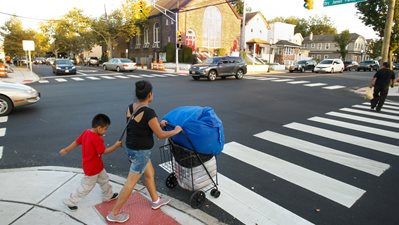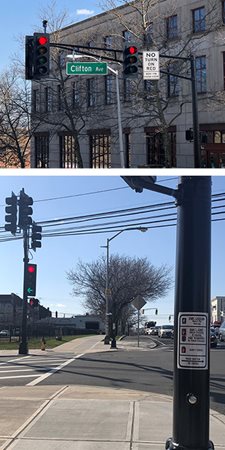Local Safety Program: Application Information
 This page is intended for NJTPA subregions interested in applying for funding through the Local Safety Program. For general information about this program visit the Local Safety and High Risk Rural Roads page.
This page is intended for NJTPA subregions interested in applying for funding through the Local Safety Program. For general information about this program visit the Local Safety and High Risk Rural Roads page.
The federal Fixing America's Surface Transportation (FAST) Act continues the Highway Safety Improvement Program (HSIP) as a core Federal-aid program with the purpose of achieving a significant reduction in fatalities and serious injuries on all public roads, including non-State-owned public roads. Highway Safety Improvement projects must be consistent with the State’s Strategic Highway Safety Plan (SHSP) and are selected on the basis of supportive crash data.
 In January 2012, FHWA issued a “Guidance Memorandum on Promoting the implementation of Proven Safety Countermeasures”. This guidance takes into consideration the latest safety research to advance a group of countermeasures that have shown great effectiveness in improving safety. In 2021, FHWA updated the list which now includes 28 Proven Safety Countermeasures. Consideration of FHWA proven safety countermeasures is an important component in this program.
In January 2012, FHWA issued a “Guidance Memorandum on Promoting the implementation of Proven Safety Countermeasures”. This guidance takes into consideration the latest safety research to advance a group of countermeasures that have shown great effectiveness in improving safety. In 2021, FHWA updated the list which now includes 28 Proven Safety Countermeasures. Consideration of FHWA proven safety countermeasures is an important component in this program.
A solicitation for the Local Safety Program occurs on nearly an annual basis. Program details include:
-
Improvements NOT eligible under this program: Routine maintenance/ replacement projects (including general resurfacing projects), congestion management/roadway capacity enhancements (road widening), improvements involving State, U.S. and Interstate highways including any improvements at intersections with such facilities and aesthetic improvements along the right-of-ways;
NJTPA supports the Subregions with traffic counts, crash analysis, signal warrant analysis, lighting analysis, conceptual layouts and HSM/Benefit Cost analysis through the Consultant Assistance with Local Safety Programs Studies/Analyses.
Projects that have been selected to advance in the program can be further assisted through the Local Safety Engineering Assistance Program (LSEAP). The LSEAP provides Subregions with design assistance in the preparation of plans, specifications, permitting and cost estimates needed for construction authorization.
Examples of LSP Implementation
The City of Newark was designated by the FHWA as a pedestrian focus city. the NJTPA has been working with the City on numerous safety projects at intersections and along corridors to improve pedestrian safety. Click here to see visual rendering of a LSP project on Broad Street.
A road diet is a Poven Safety Countermeasure that hsd been shown to reduce fatal and serious injury crashes between 19-47%. It pprovides better mobility and access for all road users, while calming trafic and enhancing overall quality of life. Click here to see a rendering of a road diet project in Manville, NJ.
FY 2025 LSHRRR Program Application & Guidelines
Contact Information
Christine Mittman
Project Manager, Safety Programs
973-639-8448
[email protected]
Patricia Newton
Project Lead, Safety Programs
973-877-8128
[email protected]
or
Sascha Frimpong
Director, Local Programs and Project Development
973-639-8422
[email protected]